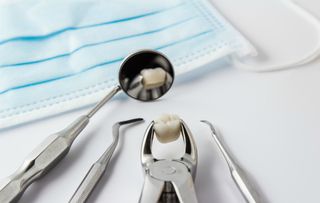Wisdom teeth: wisdom tooth pain and wisdom tooth pain relief
Wisdom teeth can cause pain and discomfort when they're coming through, and anyone who's ever had toothache will know that it's hard to ignore pain in your mouth.


Wisdom teeth can cause pain and discomfort when they're coming through, and anyone who's ever had toothache will know that it's hard to ignore pain in your mouth.
It can be quite worrying while wisdom teeth are growing - they're likely to feel strange and uncomfortable and can cause you problems when you're eating.
The good news is that most wisdom teeth only cause a bit of discomfort for a short while and don't need to be taken out.
If wisdom teeth do need to be taken out, just think how relieved you'll be afterwards when you know they'll never cause you problems again. Remember that it's only a minor operation and the pain relief you'll get during it means you won't feel a thing.
We've spoken to Dr Nigel Carter, chief executive of the British Dental Foundation, about how to deal with wisdom teeth that are growing and causing discomfort.
What are wisdom teeth?
Wisdom teeth are our last teeth to come through. They grow in the back of the mouth - 2 at the top and 2 at the bottom. They usually appear when we're between 17 and 25, although it can be a lot later or not at all.
Adults can get up to 32 teeth, but often our jaws are too small and we only have room for 28.
GoodtoKnow Newsletter
Parenting advice, hot topics, best buys and family finance tips delivered straight to your inbox.
When do wisdom teeth cause problems?
Most of the time they don't! In many cases they just grow normally and might hurt a bit and maybe be a bit swollen while they're pushing through the gums - but this is only ever temporary.
But sometimes they can become impacted, which is when the wisdom tooth gets stuck against the tooth in front. Wisdom teeth can also become infected easily because they're difficult to clean.
Dealing with growing wisdom teeth
Do wisdom teeth hurt when they come in?
It's very common for wisdom teeth to hurt while they're coming through - which can be irritating and can make eating difficult.
One way to reduce swelling and soreness is to make a salt water mouthwash. Mix a teaspoon of salt into a glass of medium hot water (make sure it's not too hot - burning your mouth won't help!) and swill it round your mouth - especially round the affected area. You can do this several times a day.
Pain-relieving tablets like aspirin, paracetamol and ibuprofen can help too.
If discomfort and pain continues for more than a few days or you find it difficult to open your mouth, you should see your dentist.
Is it necessary to have wisdom teeth removed?
Wisdom teeth are taken out less often now then they used to be. Your dentist will only recommend you have them out if they're causing constant problems, such as: * If they're not coming through into a useful position, * They're causing you pain, * They're partly decayed because you haven't been able to clean them properly.
Is wisdom tooth removal painful?
It all depends on the position of the tooth. Generally, the dentist will make a small cut in the gum above the tooth, and will possibly remove some jaw bone if it's covering the tooth.
If the tooth is impacted it might be cut into small pieces to help with removal.
Getting wisdom tooth removal
There are several options for how to have your wisdom teeth taken out, and your dentist will advise which is the best for you.
Although you might think you'd rather not have them taken out because it's not very pleasant, try to remember that having them out will save you a lot of trouble in the long run.
You will be in excellent hands and your dentist or surgeon will make the surgery as comfortable as possible.
Here Dr Brian Franks, clinical director of dentistry at Bupa, has given us a rundown of the different ways to have your wisdom teeth taken out and tips on how you can help your mouth to recover.
Your dentist or surgeon will always explain what's going to happen.

How they're taken out
Wisdom teeth that have grown normally into the mouth will usually be taken out by straightforward removal.
If the wisdom tooth is impacted, ie has not grown fully into the mouth or is completely encased in the jaw bone, the gum will be pushed back and a bit of the jaw bone will need to be removed too.
You might need a few stitches. Sometimes they dissolve naturally or you might need to come back to have them taken out.
After the surgery you'll be given information on how to look after your mouth.
Local anaesthetic
A local anaesthetic is when the area around your tooth is numbed. You'll have an injection into your gum which will be near enough painless. The tooth will then be taken out without you being able to feel it.
Side effects A local anaesthetic lasts for 2-4 hours (your dentist will make it last for as long as they need it to). While the anaesthetic is working you'll have numbness of your mouth and lip. This will have no long-term effect on your face.
Healing Your mouth will begin to heal after about a week. The gum will usually heal completely after a month, although it can take 3-6 months for the bone to remodel.
The more complicated the surgery the longer it'll take to heal. So if you have had some bone removed it's likely to be a bit more sore. This isn't anything to worry about but you should rest for the night after you've had the surgery and take care over the next few days. You're fine to go to work the next day.
Conscious sedation
Conscious sedation is where you're given a drug that doesn't make you sleep but makes you feel more relaxed and light-headed. You'll be given a local anaesthetic as well. You will still respond to commands but you won't remember much of the surgery afterwards.
The sedation will either be given through the a needle in the back of the hand, or a milder one will be given as a tablet or by breathing in gas through a mask.
This is sometimes given to nervous patients to avoid them having a general anaesthetic (which takes longer to recover from). You can request this if you're having your wisdom teeth out, but not all dentists will have the facilities to do it. They can refer you to somewhere that does.
Side effects Sedation makes you feel drowsy afterwards, so you'll need someone to help you get home. Having this treatment won't affect how long it takes your mouth to recover.
Healing It's the same as if you have them taken out with just a local anaesthetic, it will depend on how difficult the extraction was.
General anaesthetic
A general anaesthetic is often used if taking the teeth out is going to take longer than normal. This could be because it's a more difficult extraction or sometimes because it's for more than one tooth.
You'll need to go to a hospital to have wisdom teeth out this way. Sometimes you'll be given a pre-med before the surgery which will make you feel relaxed.
You'll then have a scratch into your hand and a needle will be put in - it'll only feel like a tiny pinprick - the surgeons are very skilled. Then they'll put a sedative in and before you know it you'll be awake and the surgery will be over.
Side effects You'll be drowsy for 24-48 hours and might need to take a day or two off work. You'll need someone to take you home. Other side effects include feeling confused and having a headache and a sore throat for a few days.
Healing The general anaesthetic doesn't affect the healing time of the mouth - but if it was a more difficult extraction (which it could be - that's one of the reasons the dentist might have suggested you had a general anaesthetic anyway) then it will take longer to heal then a straightforward extraction would.
After having your wisdom tooth extraction
Your surgeon will go over all of this with you. How much discomfort you feel after the surgery will depend on how complicated it was.
Pain after your treatment is normal. How much you get will depend on how complicated your surgery was. You might be prescribed painkillers - if not you can use ibuprofen and paracetamol.
Swelling after your treatment is also a normal part of the healing process and doesn't mean you've got an infection. It should last for up to 3-4 days.
Bleeding is a natural response to this surgery too. You might be given gauze by your surgeon. If you're bleeding put the gauze over where the tooth was and bite on it firmly for 15 minutes.
Eating solid food may be difficult to eat for a day or two.
How can I help recovery and pain relief?
To avoid infection you can rinse your mouth with salt water. Mix one teaspoon of salt into a glass of hot water (but not so hot that it burns your mouth) and swill it round your mouth. Start this 6 hours or so after treatment and repeat 4 times a day for 4-5 days.
You probably won't be prescribed antibiotics because they don't usually help. If you are, make sure you take these and are careful with contraception. It'll make the pill less effective, so you'll need to use additional contraception while you're on the antibiotics and for 7 days after.
You should brush your teeth normally but be gentle around the area where the tooth has been removed.
What should I watch out for after I've had my wisdom teeth removed?
Again, your surgeon will go over all of this with you.
If your mouth is bleeding and gauze doesn't stop it, you have swelling that doesn't go down after a few days, or pain that doesn't respond to painkillers then contact your dentist or go to casualty.
There is a slight risk of infection, as with any surgery. A sign of infection is if pain and swelling gets worse after 4-6 days after the treatment. If this happens then contact your clinic.
There is also a complication that affects about 2 per cent of patients called dry socket. Signs of this are marked pain from where the tooth has been removed, but with very little or no additional swelling. This can be cured, but again you need to contact your clinic.

Sibelle Mehmet is a Junior Digital Writer at Goodto.com. She joined the team in April 2019 and was her first job since completing a MA in Magazine Journalism at City, the University of London in the summer of 2019. Sibelle previously interned at a number of national titles including OK!, Heat, Closer, Mother & Baby, and The Times Newspaper magazine. She's written extensively about the latest celebrity, showbiz, and royal news.